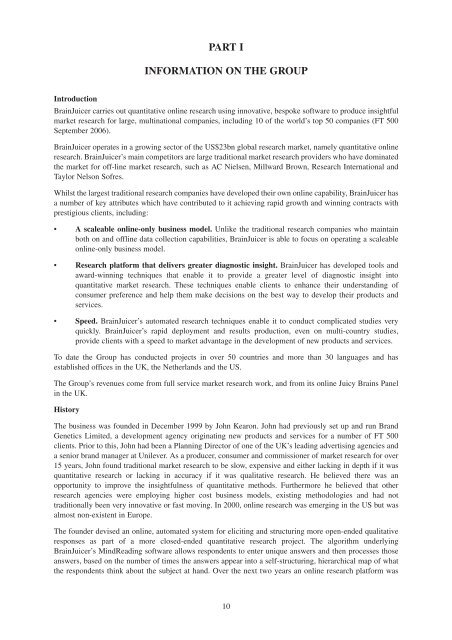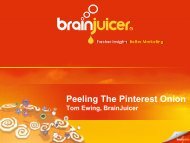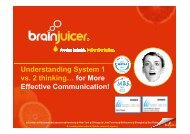Admission Document - BrainJuicer
Admission Document - BrainJuicer
Admission Document - BrainJuicer
You also want an ePaper? Increase the reach of your titles
YUMPU automatically turns print PDFs into web optimized ePapers that Google loves.
PART I<br />
INFORMATION ON THE GROUP<br />
Introduction<br />
<strong>BrainJuicer</strong> carries out quantitative online research using innovative, bespoke software to produce insightful<br />
market research for large, multinational companies, including 10 of the world’s top 50 companies (FT 500<br />
September 2006).<br />
<strong>BrainJuicer</strong> operates in a growing sector of the US$23bn global research market, namely quantitative online<br />
research. <strong>BrainJuicer</strong>’s main competitors are large traditional market research providers who have dominated<br />
the market for off-line market research, such as AC Nielsen, Millward Brown, Research International and<br />
Taylor Nelson Sofres.<br />
Whilst the largest traditional research companies have developed their own online capability, <strong>BrainJuicer</strong> has<br />
a number of key attributes which have contributed to it achieving rapid growth and winning contracts with<br />
prestigious clients, including:<br />
• Ascaleable online-onlybusiness model.Unlike the traditional research companies who maintain<br />
both on and offline data collection capabilities, <strong>BrainJuicer</strong> is able to focus on operating a scaleable<br />
online-only business model.<br />
• Research platform that delivers greater diagnostic insight. <strong>BrainJuicer</strong> has developed tools and<br />
award-winning techniques that enable it to provide a greater level of diagnostic insight into<br />
quantitative market research. These techniques enable clients to enhance their understanding of<br />
consumer preference and help them make decisions on the best way to develop their products and<br />
services.<br />
• Speed. <strong>BrainJuicer</strong>’s automated research techniques enable it to conduct complicated studies very<br />
quickly. <strong>BrainJuicer</strong>’s rapid deployment and results production, even on multi-country studies,<br />
provide clients with a speed to market advantage in the development of new products and services.<br />
To date the Group has conducted projects in over 50 countries and more than 30 languages and has<br />
established offices in the UK, the Netherlands and the US.<br />
The Group’s revenues come from full service market research work, and from its online Juicy Brains Panel<br />
in the UK.<br />
History<br />
The business was founded in December 1999 by John Kearon. John had previously set up and run Brand<br />
Genetics Limited, a development agency originating new products and services for a number of FT 500<br />
clients. Prior to this, John had been a Planning Director of one of the UK’s leading advertising agencies and<br />
a senior brand manager at Unilever. As a producer, consumer and commissioner of market research for over<br />
15 years, John found traditional market research to be slow, expensive and either lacking in depth if it was<br />
quantitative research or lacking in accuracy if it was qualitative research. He believed there was an<br />
opportunity to improve the insightfulness of quantitative methods. Furthermore he believed that other<br />
research agencies were employing higher cost business models, existing methodologies and had not<br />
traditionally been very innovative or fast moving. In 2000, online research was emerging in the US but was<br />
almost non-existent in Europe.<br />
The founder devised an online, automated system for eliciting and structuring more open-ended qualitative<br />
responses as part of a more closed-ended quantitative research project. The algorithm underlying<br />
<strong>BrainJuicer</strong>’s MindReading software allows respondents to enter unique answers and then processes those<br />
answers, based on the number of times the answers appear into a self-structuring, hierarchical map of what<br />
the respondents think about the subject at hand. Over the next two years an online research platform was<br />
10








